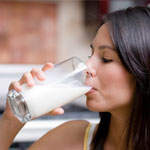Benefits Of Drinking Milk During Pregnancy
 Pregnant women require more nutrients than they normally consume. Milk is a food recommended especially for an expecting mother. It contains calcium, Vitamin D, riboflavin and energy. Not drinking milk stunts the growth of the baby and lowers his birth weight, according to medical research.
Pregnant women require more nutrients than they normally consume. Milk is a food recommended especially for an expecting mother. It contains calcium, Vitamin D, riboflavin and energy. Not drinking milk stunts the growth of the baby and lowers his birth weight, according to medical research.
Some women avoid drinking milk assuming that it will lower their fat intake and minimize weight gain. They also believe that not drinking milk will save their child from developing allergies. This is a misconception. Mothers-to-be should drink milk because the calcium in it is needed for building strong bones of the baby. A baby is born with reserves of iron, calcium and some other nutrients which it gets from the mother. So pregnant women must consume milk in some form, about 1200 mg of calcium is required per day.
Some people advocate drinking special or fortified milk when a woman is expecting. This is really not necessary. Normal pasteurised milk, either whole or toned, is sufficient nutritionally. All gynaecologists give pregnant women the recommended doses of folic acid so no special milk is required.
If, for medical reasons, you are unable to drink cow milk, then you can opt for soya milk which has folic acid and Vitamin D added to it. The human body is able to make Vitamin D with the help of sunlight so sitting for a while in early morning sun is beneficial. In addition, dairy products like yogurt, ice cream and cheese can be eaten.
The importance of folic acid cannot be undermined. Many doctors say that folic acid supplements should be given prenatally to women. This dosage should begin three months before conception as a lack of it causes many defects in the first twenty eight days of pregnancy. Most women are not even aware that they are pregnant with in this time. The defects are spina bifida and those of the neural tubes in which there is incomplete development of brain and spinal cord.
Folic acid or folate is a part of the Vitamin B complex group of vitamins namely Vitamin B9. It is found in leafy green vegetables. The recommended dose is 0.4 mg per day. It is also needed for cell formation and development of DNA.
To complete the nutrition of an expecting mother a balanced diet is essential. Besides calcium and folic acid, adequate amounts of proteins, carbohydrates, fats, vitamins and minerals are required. These requirements can be fulfilled by eating, meat, corn, bread and fresh fruits and vegetables. The latter will provide adequate fibre to prevent constipation.
Iron is an important mineral required in pregnancy which is absent in milk. A good quantity of fruits such as apples and green leafy vegetables will provide iron and make up this deficiency.